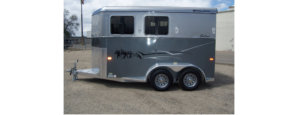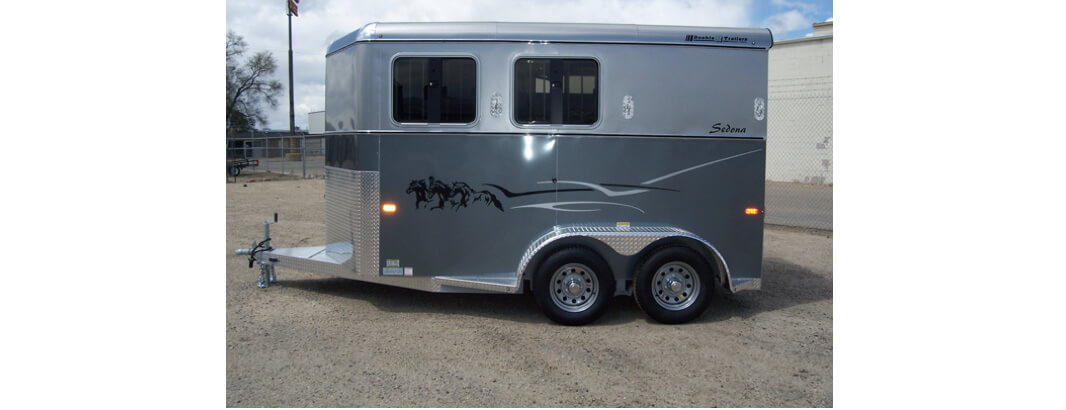Wheel Bearings, Races, and Seals, OH MY!
By Leigh Goodison Grieve
 In the last article on horse trailer safety and maintenance we discussed tires and wheels. If the wheels of your trailer are the legs, then certainly the wheel bearings, spindles and axles are the heart—without them, you don’t have a trailer. Most trailer owners know that wheel bearings need to be routinely maintained and repacked; however, this all-important maintenance step is often forgotten or done improperly.
In the last article on horse trailer safety and maintenance we discussed tires and wheels. If the wheels of your trailer are the legs, then certainly the wheel bearings, spindles and axles are the heart—without them, you don’t have a trailer. Most trailer owners know that wheel bearings need to be routinely maintained and repacked; however, this all-important maintenance step is often forgotten or done improperly.
We’ve said bearings are the heart of your trailer. And, just as you wouldn’t let a doctor operate who didn’t know how your heart works, you shouldn’t work on your trailer without understanding the wheel bearing system. Each trailer wheel has inner and outer bearings that allow the wheel to spin around the axle with minimum friction. All bearings require lubrication. Without lubrication the bearings generate too much heat. Overheating can destroy bearings, spindles, and axles, so it’s important to maintain constant (though not excessive) lubrication. There are oil bath systems, such as in the Brenderup trailers, but these are not the norm and need maintenance as well.
A bad bearing can lead to the loss of wheel alignment, uneven and additional wear to your tires, and possible damage to the wheel’s rim or your axle. In addition, when the wheel bearings become burned from friction, they start to embed bearing material onto the spindle. The spindle is a permanent part of the axle and if it becomes damaged or brittle from heat, it can snap. Having a spindle break is extremely dangerous, not to mention expensive, as you would have to replace the whole axle. You may also notice leaked bearing grease, which can get onto the brake surface. This not only makes the brakes inoperable, but they can catch fire. Grease and rubber are extremely flammable.
The major problem with the manufacture of horse trailers is that many of the components, especially bearings, are now manufactured in third world countries and the steel is inferior and the parts poorly made. These bearings will only hold up for several years; far less if they’re not regularly repacked or the trailer is used often. Driving over rough, graveled or potholed roads—in other words roads to our favorite trails— increases the damage. The fact is, things wear out.
So, how do you know your friendly local mechanic is repacking your bearings correctly? They need to be completely disassembled, cleaned, and inspected. Some people just put new grease over worn and burnt bearings or—even worse—just pump lubricant into the outer bearings without actually removing and cleaning them. Ask questions of your mechanic to make sure the job’s done right.
Without frequent movement, lubricant will settle to the bottom of the bearings and the hub that carries the bearings. When the trailer is finally used again, the top portions of the bearings are devoid of lubrication, so it’s metal-on-metal, causing overheating and damage waiting for the grease to heat up. Assuming your bearings are in good shape and have sufficient lubrication, take your trailer out for a spin once a month, even if you’re not going to ride. This also helps keep the brake drum surface from rusting.
There are a couple of ways you can check for yourself if wheel bearings are becoming worn, even if you have them repacked regularly:
- Take hold of the wheel with the palm of one hand on the inside and with the other palm on the outside, push and pull back and forth. There should be a slight amount of play, usually around an eighth of an inch or less. Too tight is also not good because this will heat the bearing up. But if you hear ‘thunk, thunk,’ there is either too much play or the bearing is worn out. Check all the wheels this way.
- After a routine trip when you’ve been hauling the trailer for at least ten miles, pull over to a safe location and check near the lug nut surface for heat. If this surface is too warm to hold your hand against, then the bearing is generating excessive heat and may be worn out, have insufficient play or need lubrication. Excessive heat can also be caused by over braking (especially after descending a long hill) and overloading.
The above instructions can be invaluable when purchasing a used trailer, as these are typically the most common, and undetected, problems that would need attention, and are expensive to repair if the damage is extensive.
Tip of the month: A lot of the rust on trailers starts with small rock chips and then progresses. Invest in your trailer by installing mud flaps on your tow vehicle. This will not only help prevent damage to the paint and aluminum, there will be less mud and debris to clean up when you wash the trailer.
Leigh Goodison Grieve is a freelance writer and editor, whose work has appeared in Western Horseman and Northwest Family Magazine among others. She is also co-owner of Horse Trailer Restoration, LLC, located in Battle Ground, WA, where she and her partner David Bodin restore, repair and maintain horse trailers. For more information see: www.handyrider.com.*
*This link was not active at the time this article was added to the website in 2019.
Published July 2011 Issue

The Northwest Horse Source is an independently owned and operated print and online magazine for horse owners and enthusiasts of all breeds and disciplines in the Pacific Northwest. Our contemporary editorial columns are predominantly written by experts in the region, covering the care, training, keeping and enjoyment of horses, with an eye to the specific concerns in our region.


